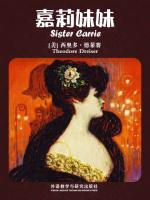''Sister Carrie''
In a world where literature often serves as a mirror to society's complexities, "Sister Carrie," penned by Theodore Dreiser, emerges as a profound narrative that explores the depths of human ambition, societal constraints, and the relentless pursuit of the American Dream. This novel, a testament to Dreiser’s literary prowess, offers an intimate portrayal of Carrie, a young woman navigating the intricate labyrinth of early 20th-century America, showcasing her metamorphosis from a naïve country girl into a self-assured actress.
The narrative commences with Carrie’s departure from her rural home in Wisconsin to the bustling city of Chicago, driven by a youthful desire to seek a life beyond the mundane existence she had been accustomed to. Carrie’s journey is emblematic of the countless individuals who flocked to cities during the industrial revolution, each carrying the torch of hope, illuminating their paths towards prosperity and fulfillment. However, unlike many fairy tale stories, Dreiser subverts conventional expectations by painting an unapologetically realistic picture of Carrie’s trials and tribulations.
One of the most striking aspects of the novel is Dreiser’s meticulous dissection of societal norms and economic disparities. He adeptly uses Carrie’s interactions and relationships to reflect the stark contrast between the haves and the have-nots. As Carrie traverses the urban landscape, she encounters characters like Drouet and Hurstwood, whose lives are a testament to the materialistic values and superficial allure of wealth that defined the era. Through these relationships, readers are granted access to the inner workings of a society grappling with rapid urbanization and industrial growth, showcasing how these forces shaped individual destinies.
Carrie’s evolution throughout the narrative is both compelling and thought-provoking. She embarks on a journey of self-discovery, often making choices that are at odds with the moral compass of her time. Her decisions, while controversial, highlight the lengths one might go to escape the shackles of poverty and societal stigma. Carrie’s rise in the world of theater, despite the numerous setbacks and moral dilemmas she faces, speaks volumes about her resilience and ambition. It is through her perseverance that readers witness the birth of a new identity—one that is strong, independent, and self-assured.
Dreiser’s use of naturalistic style further enhances the novel’s impact. By stripping down the narrative to its raw essence, he forces readers to confront the harsh realities faced by individuals like Carrie. The deterministic undertones suggest that human fate is largely governed by external forces, challenging the notion of free will. Yet, paradoxically, it is within this bleak outlook that Carrie finds her agency, proving that the human spirit’s tenacity can triumph over the indifferent universe.
Moreover, "Sister Carrie" delves deep into the concept of the American Dream, questioning whether it is truly accessible to all. Carrie’s initial successes might suggest that the dream is attainable, but a closer examination reveals a more nuanced picture. Her victories come at a cost—isolation, loneliness, and a lingering sense of emptiness. Dreiser seems to imply that the relentless pursuit of material success can lead to spiritual impoverishment, challenging readers to ponder the true essence of happiness and fulfillment.
In conclusion, "Sister Carrie" stands as a literary milestone that transcends time and space. Dreiser’s ability to weave a narrative that is simultaneously a personal tale and a social critique is nothing short of genius. The novel not only provides insight into the struggles and triumphs of its protagonist but also offers a broader commentary on the human condition, societal norms, and the elusive nature of the American Dream. As a college freshman delving into the realms of literature, "Sister Carrie" proves to be an enlightening read, prompting reflection on one's place in the world and the indefatigable human spirit that drives us forward, against all odds.



 京公网安备 11010802032529号
京公网安备 11010802032529号